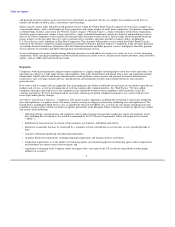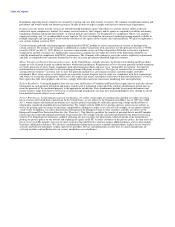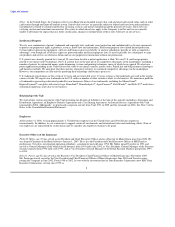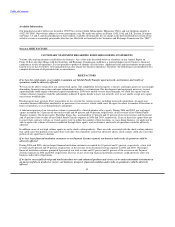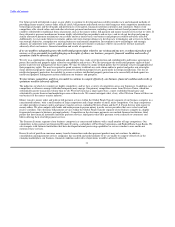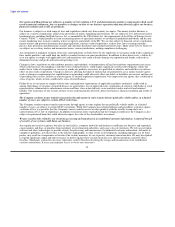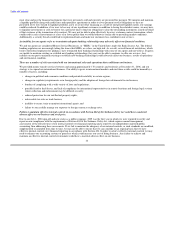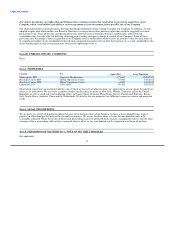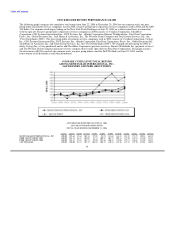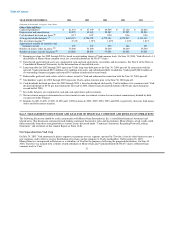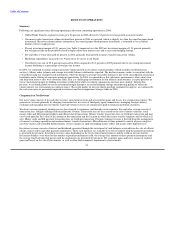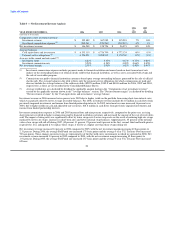MoneyGram 2006 Annual Report Download - page 19
Download and view the complete annual report
Please find page 19 of the 2006 MoneyGram annual report below. You can navigate through the pages in the report by either clicking on the pages listed below, or by using the keyword search tool below to find specific information within the annual report.
Table of Contents
must clear and pay the financial instruments that were previously sold and currently are presented for payment. We monitor and maintain
a liquidity portfolio along with credit lines and repurchase agreements in order to cover payment service obligations as they are
presented. If we were forced to liquidate portfolio assets or secure other financing as a result of unexpected liquidity needs, our earnings
could be reduced. In addition, if we were to lose any of our significant customers, in addition to losing the related revenues, we may have
to liquidate investments or seek to borrow for a period of time to fund our obligation to clear the outstanding instruments issued on behalf
of that customer at the termination of its contract. We may not be able to plan effectively for every customer contract termination, which
could result in sale of investments at a loss of or lower profits than we would otherwise realize due to prevailing market conditions.
Additionally, a security breach could lead to reputational harm and make our customers less confident in our services.
An inability for our agents or for us to maintain adequate banking relationships may adversely affect our financial condition.
We and our agents are considered Money Service Businesses, or "MSBs," in the United States under the Bank Secrecy Act. The federal
banking regulators are increasingly taking the stance that MSBs, as a class, are high risk. As a result, several financial institutions, which
look to the federal regulators for guidance, have terminated their banking relationships with some of our agents and one with us. If agents
are unable to maintain existing or establish new banking relationships, they may not be able to continue to offer our services. Any
inability on our part to maintain existing or establish new banking relationships could adversely affect our business, results of operations
and our financial condition.
There are a number of risks associated with our international sales and operations that could harm our business.
We provided money transfer services between and among approximately 170 countries and territories at December 31, 2006, and our
strategy is to expand our international business. Our ability to grow in international markets and our future results could be harmed by a
number of factors, including:
• changes in political and economic conditions and potential instability in certain regions;
• changes in regulatory requirements or in foreign policy and the adoption of foreign laws detrimental to our business;
• burdens of complying with a wide variety of laws and regulations;
• possible fraud or theft losses, and lack of compliance by international representatives in remote locations and foreign legal systems
where collection and enforcement may be difficult or costly;
• reduced protection for our intellectual property rights;
• unfavorable tax rules or trade barriers;
• inability to secure, train or monitor international agents; and
• failure to successfully manage our exposure to foreign currency exchange rates.
Failure to maintain effective internal controls in accordance with Section 404 of the Sarbanes-Oxley Act could have a material
adverse affect on our business and stock price.
Due to our July 1, 2004 spin-off and new status as a public company, 2005 was the first year in which we were required to certify and
report on our compliance with the requirements of Section 404 of the Sarbanes-Oxley Act, which requires annual management
assessments of the effectiveness of our internal control over financial reporting and a report by our independent registered public
accounting firm addressing these assessments. If we fail to maintain the adequacy of our internal controls, as such standards are modified,
supplemented or amended from time to time, we may not be able to ensure that we can conclude on an ongoing basis that we have
effective internal controls over financial reporting in accordance with Section 404. In order to achieve effective internal controls we may
need to enhance our accounting systems or processes which could increase our cost of doing business. Any failure to achieve and
maintain an effective internal control environment could have a material adverse effect on our business.
16


